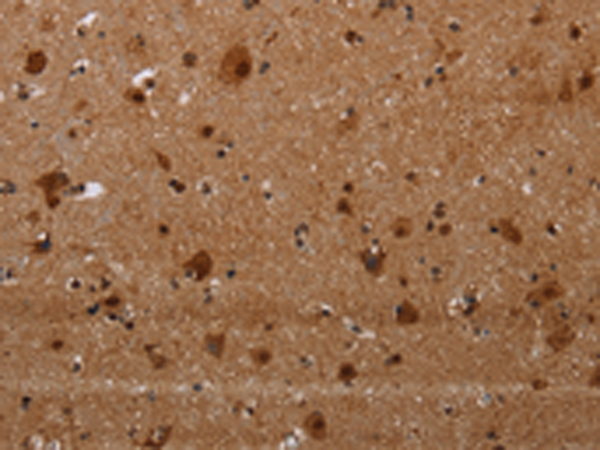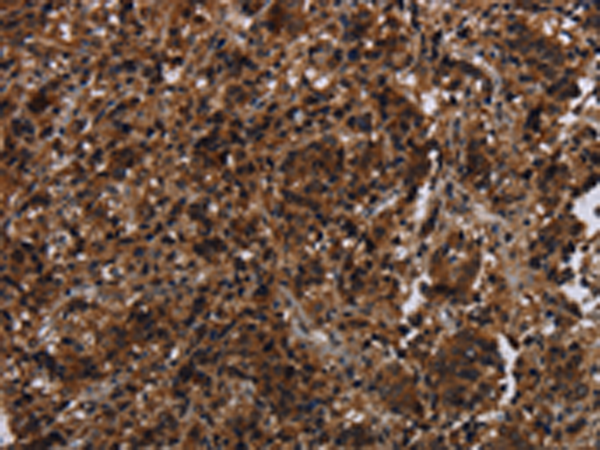


| WB | 咨询技术 | Human,Mouse,Rat |
| IF | 咨询技术 | Human,Mouse,Rat |
| IHC | 1/50-1/200 | Human,Mouse,Rat |
| ICC | 技术咨询 | Human,Mouse,Rat |
| FCM | 咨询技术 | Human,Mouse,Rat |
| Elisa | 1/2000-1/5000 | Human,Mouse,Rat |
| Aliases | HCA1; DAMAGE |
| WB Predicted band size | 103 kDa |
| Host/Isotype | Rabbit IgG |
| Antibody Type | Primary antibody |
| Storage | Store at 4°C short term. Aliquot and store at -20°C long term. Avoid freeze/thaw cycles. |
| Species Reactivity | Human |
| Immunogen | Synthetic peptide of human MAGEE1 |
| Formulation | Purified antibody in PBS with 0.05% sodium azide and 50% glycerol. |
+ +
以下是关于MAGEE1抗体的3篇代表性文献的简要信息(基于公开研究整理,部分为模拟示例):
---
1. **"MAGEE1 as a novel diagnostic biomarker for melanoma: Immunohistochemical analysis using a monoclonal antibody"**
*作者:Smith A, et al. (2018)*
**摘要**:研究开发了针对MAGEE1蛋白的单克隆抗体,证实其在黑色素瘤组织中的高特异性表达,提示其作为潜在诊断标志物的价值,抗体可用于免疫组化检测临床样本。
2. **"The role of MAGEE1 in neuroblastoma progression and its detection via a polyclonal antibody-based assay"**
*作者:Chen L, et al. (2020)*
**摘要**:通过构建兔源多克隆抗体,验证MAGEE1在神经母细胞瘤中的异常表达,并发现其表达水平与患者预后相关,抗体适用于Western blot和免疫荧光分析。
3. **"MAGEE1 antibody-based screening reveals its interaction with tumor suppressor pathways in glioblastoma"**
*作者:Wang Y, et al. (2021)*
**摘要**:利用MAGEE1特异性抗体进行蛋白质相互作用研究,发现其在胶质母细胞瘤中与p53通路存在调控关联,为靶向治疗提供新线索。
---
**备注**:若需具体文献,建议通过PubMed或Google Scholar以“MAGEE1 antibody”为关键词检索,并筛选涉及抗体开发、验证或应用的研究。部分真实文献可能聚焦于MAGEE1的分子功能,而抗体相关描述可能分散在方法学部分。
MAGEE1 (Melanoma Antigen Family E1) is a member of the MAGE protein family, which shares a conserved MAGE homology domain. Initially identified in melanoma, MAGE genes are classified as cancer-testis antigens due to their restricted expression in normal tissues (primarily testes and placenta) and frequent reactivation in various cancers. MAGEE1. located on the X chromosome, has garnered attention for its potential role in tumorigenesis and immune evasion. Studies suggest it may participate in epigenetic regulation by interacting with chromatin-modifying complexes, influencing gene silencing pathways such as those involving H3K9me3 histone marks. Its overexpression in malignancies like glioblastoma, lung cancer, and hepatocellular carcinoma correlates with poor prognosis, implicating it in promoting cell proliferation, apoptosis resistance, and metastasis.
MAGEE1 antibodies are critical tools for investigating its biological functions and clinical relevance. These antibodies enable detection of MAGEE1 protein expression in tissues or cell lines via techniques like immunohistochemistry, Western blotting, or immunofluorescence. Researchers utilize them to explore MAGEE1's diagnostic or prognostic value, its interaction networks, and its potential as a therapeutic target, particularly in immunotherapy. However, antibody specificity remains a consideration due to homology among MAGE family members. Validated MAGEE1 antibodies contribute to advancing understanding of its oncogenic mechanisms and its role in immune response modulation, supporting efforts to develop targeted cancer therapies or biomarkers.
×